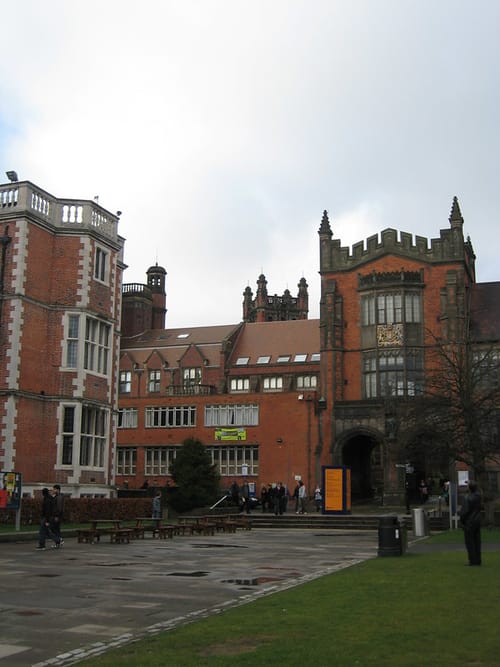Stand With Us, a charity dedicated to tackling anti-Semitism and misinformation about Israel, has recently published a report on the situation on British campuses. It paints a bleak picture. Some 38% of students say Jewish students should expect abuse if they show support for Israel. That figure goes up to 51% at the elite Russell Group universities.
The report also documents instances of staff dismissing legitimate complaints. For example, when a student pointed out a swastika that had been carved into his desk, the member of staff merely said it was probably an ancient Hindu symbol.
The report is in line with the latest report on British campus anti-semitism produced by the Community Support Trust (CST), a charity which protects the Jewish community. According to the CST there were 53 anti-Semitic incidents at universities between 2020-2022. That increased to 272 during the period 2022-2024, most of them occuring after Hamas’s 7October atrocities.
Guidance on tackling anti-Semitism was issued by Universities UK, a body representing Britain’s universities, in 2021. It recommended a light touch approach urging greater training of staff on how anti-Semitism can manifest itself. It also proposed cultivating an atmosphere of civilised dialogue on difficult issues and offers a couple of instances of effective action.
The government is looking at the issue again as the previous approach has clearly not worked. In October 2024 £7m was allocated aimed at tackling anti-Semitism with the money being used to improve staff skills and strengthening resilience against misinformation. The House of Lords had a short debate on steps universities are taking to tackle anti-Semitism and government ministers plan to hold a series of roundtable discussions on the issue. However, it is questionable whether this will be effective. Things have reached the point where Jewish students are attending weekends where they are trained on how to handle anti-Semitic abuse they might receive on campus.
A key problem is that even where staff take anti-Semitism seriously they will be facing other pressures. These will, in all likelihood, take up the bulk of their time and attention. It has been estimated that 72% of higher education providers will be running a deficit, with some facing closure, mergers or large-scale redundancies.
It is doubtful the British government would take the kind of measures that the Trump administration is taking against American universities. In 2022 it did suspend ties with the National Union of Students because of concerns over anti-Semitism. However, it would be quite another thing to go as far as the equivalent of the Trump administration’s attempt to revoke Harvard’s tax-exempt status.
There are of course real problems with the Trump administration’s approach. The legality of cutting funding and revoking Harvard’s tax status is being challenged. There is also real concern about legitimate pro-Palestinian views which do not condone terrorism are being silenced. Nevertheless the offensive has forced universities to take anti-Semitism seriously.
It is questionable as to whether that could be said in Britain. If Jewish students are having to attend weekends to learn how to deal with potential abuse the situation has become intolerable. Abuse has nothing to do with debate and free speech and goes into the realm of conduct. The question then becomes what form of pressure is necessary to bring about change.
Jewish philanthropists could cancel donations, though as yet this does not seem to have happened in Britain to anything like the extent it has in America. A Jewish family did cancel its support for an endowed chair at Newcastle University when it awarded an honorary degree to an activist who repeatedly compared Israel to Nazi Germany and accused it of harvesting the organs of Palestinians. Unfortunately such action is rare.
It is a pity there is not a British equivalent of America’s Brandeis Center which has had a significant impact on the controversy over American campus anti-Semitism. It has filed lawsuits against a group of protesters who, it alleges assaulted two janitors when they forcefully occupied Hamilton Hall at Columbia university last year. It has also filed suits against some individuals at the University of California, Los Angeles. The centre alleges that students and staff have colluded with a network of outside organisations intent on bringing criminal activity to campus. Its investigation seems to have been much more thorough and professional than any carried out by a university. Most institutions did not even have evidence-gathering procedures which were consistent across all departments.
Whether the situation is the same in Britain is not known but it is reasonable to suppose there are some similarities even if the scale is different. The Stand With Us report referred to above quotes an anti-Israel activist as saying they were hugely proud of what happened on 7 October.
UK Lawyers for Israel, a pro-Israel advocacy group, could try to play such a role similar to Brandeis. The problem is it could more easily be accused of trying to silence legitimate criticism of Israeli government policy. By way of contrast, the Brandeis Center describes itself as being there to defend the interests of the Jewish people and, importantly, to promote justice for everyone. The Free Speech Union has offered British academics legal help but could probably not launch an investigation on the scale of Brandeis.
It looks likely that the possibility of a financial and legal penalty is necessary to force universities to get serious about tackling anti-Semitism. Perhaps it is time for Britain’s Jewish philanthropic community to start taking notice of what is happening in universities. A formal investigation into whether there are links between sinister organisations and university staff and students needs to take place.
Guy Whitehouse is a member of the Academy of Ideas and the Free Speech Union. His views do not necessarily reflect those of those organisations.
The views expressed in this article do not necessarily reflect those of the Radicalism of fools project.
PHOTO: "Newcastle University, the Arches: entrance to the Quadrangle" by madraban is marked with Public Domain Mark 1.0.

